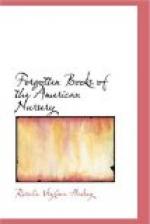Boston, however, was not at this time the only place in the colonies where primers and religious books were written and printed. In Philadelphia, Andrew Bradford, famous as the founder of the “American Weekly Mercury,” had in 1714 put through his press, probably upon subscription, the “Last Words and Dyeing Expressions of Hannah Hill, aged 11 years and near three Months.” This morbid account of the death of a little Quakeress furnished the Philadelphia children with a book very similar to Mather’s “Token.” Not to be outdone by any precocious example in Pennsylvania, the Reverend Mr. Mather soon found an instance of “Early Piety in Elizabeth Butcher of Boston, being just 8 years and 11 months old,” when she died in 1718. In two years two editions of her life had been issued “to instruct and to invite little children to the exercise of early piety.”
Such mortuary effusions were so common at the time that Benjamin Franklin’s witty skit upon them is apropos in this connection. In 1719, at the age of sixteen, under the pseudonym of Mrs. Dogood, he wrote a series of letters for his brother’s paper, “The New England Courant.” From the following extract, taken from these letters, it is evident that these children’s “Last Words” followed the prevailing fashion:
A Receipt to
make a New England
Funeral Elegy.
For the title of your Elegy. Of these you may have enough ready made at your Hands: But if you should chuse to make it yourself you must be sure not to omit the Words Aetatis Suae, which will beautify it exceedingly.
For the subject of your Elegy. Take one of your neighbors who has lately departed this life; it is no great matter at what age the Party Dy’d, but it will be best if he went away suddenly, being Kill’d, Drown’d or Froze to Death.
Having chosen the Person, take all his Virtues, Excellencies, &c. and if he have not enough, you may borrow some to make up a sufficient Quantity: To these add his last Words, dying Expressions,




